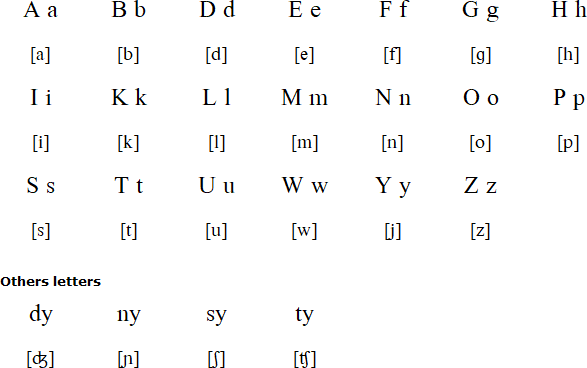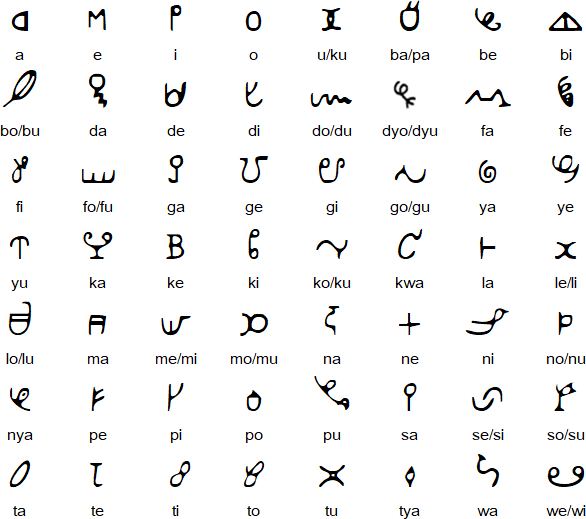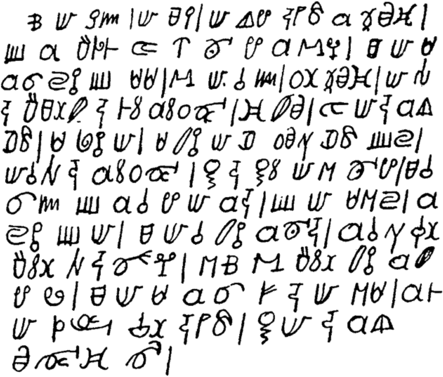Ndyuka is an English-based creole spoken in parts of Suriname and French Guiana. In 2016 Ndyuka was spoken by about 22,400 people in Suriname, and there were about 18,000 Ndyuka speakers in French Guiana in 2011 [source]. The language is also known as Aukaans, Ndjuká, Ndyuka tongo, Nenge, Nenge Tongo, Nengee Tongo, Njuká or Okanisi.
In Suriname Ndyuka is spoken in east of the country in the districts of Brokopondo, Commewijne, Marowijne, Para and Sipaliwini. In French Guinana it is spoken in the Cayenne islands, and along the border with Suriname.
Ndyuka uses mainly English vocabulary, and some Dutch and Portuguese words as well. The grammar and pronunciation have influences from a number of West African languages.
There are two ways to write Ndyuka with the Latin alphabet: an old Dutch-based orthography and a modern English-based one, which was first proposed in 1984. However, few people are able to read and write their language. It is used to some extent in religious literature and services, and on the radio in Suriname, and is taught in primary schools in French Guiana.

The Afaka syllabary for Ndyuka was invented by Afaka Atumisi of eastern Suriname in 1908. Afaka claimed that he had a dream in which a spirit prophesied that a script would be revealed to him. He then devised the Afaka syllabary (afaka sikifi), which is also known as the Ndjuká or Djuka script.
In 1915 a Catholic missionary in Suriname, Brother Bernard, saw a man, Afaka Atumisi's brother-in-law Abena, reading a book written in strange symbols. Abena was one of about 30 people who know the script at that time, and he told Brother Bernard about it. One of Brother Bernard's colleagues, Father Morssink, studied the script and tried to promote it, though without much success.
The Ndjuká syllabary does not represent all the sounds of the Ndjuká language, and as it became associated with European missionaries, the Ndjuká speakers saw the script as a relgious one unsuitable for everyday purposes. There was also no tradition of literacy among them. It is believed that this script is no longer used.

Download script charts for Ndyuka (Excel)
Download a Ndjuká font (TrueType format, 22K).
This is apparently the first letter written by Afaka. It was copied into the Patili Molosi Buku in about 1917.

ke mi gadu | mi masa | mi bigi na ini a ulotu |
fu a papila di yu be gi afaka | ma mi de
aga siki fu dede | fa mi sa du | oli ulotu | mi go
na pamalibo na lati ati oso | tu bolo | di mi ná abi
moni | de yaki mi | de taki mi mu oloko moni fosi |
mi sa go na ati osu | da na dati mi e begi | masa
gadu fu a sa gi mi ana | fu mi deesi | a
siki fu mi | ma mi sa taki abena | a sa kon tyali
patili go na ndyuka | eke fa patili taki a bun
gi wi | ma mi de aga pe na mi ede | ala
mi noso poli na ini ye | da mi ná abi
losutu ye |
Oh my God, my Lord, I start with the words on the paper that you've given Afaka. But I'm deathly ill. How can I say it? I went to Paramaribo, Lands Hospital, two times. Because I have no money, they chased me away. They say I must first earn money (before) I go to the Hospital. Therefore I pray the Lord God that he will give me a hand with the medicine for my illness. But I will talk to Abena. He will bring this to the Priest of the Ndyuka. So as the Father says it is good for us. But I have pain in my head. All my nose is rotting from the inside, I tell you. So I have no rest, I tell you.
Source: http://en.wikipedia.org/wiki/Afaka_syllabary
Information about Ndyuka | Numbers
Information about the Ndyuka language and the Afaka syllabary
https://en.wikipedia.org/wiki/Ndyuka_language
https://www.ethnologue.com/language/djk
http://www.suriname-languages.sil.org/Aukan/Aukan.html
http://www.sil.org/americas/suriname/Aukan/Aukan.html
http://en.wikipedia.org/wiki/Afaka_syllabary
http://www.unicode.org/L2/L2012/12228-n4292-afaka.pdf
Betawi, Bislama, Cape Verdean Creole, Chavacano, Chinook Jargon, Dominican Creole French, Fanagalo, French Guianese Creole, Guadeloupean Creole, Guinea-Bissau Creole, Haitian Creole, Jamaican, Kituba, Manado Malay, Mauritian Creole, Nagamese, Ndyuka, Norfuk, Nubi, Palenquero, Papiamento, Pijin, Réunion Creole, Sango, Saramaccan, Seychelles Creole, Sierra Leonean Creole, Singlish, Sranan, Saint Lucian Creole, Tok Pisin, Torres-Strait Creole
Bamum, Caroline Island Script, Celtiberian, Cherokee, Cypriot, Dunging (Iban), Eskayan, Hiragana, Iberian, Katakana, Kpelle, Loma, Mende (Kikakui), Mwangwego, Ndjuká, Nüshu, Nwagụ Aneke, Vai, Yi, Yugtun
Languages written with the Latin alphabet
Page last modified: 28.07.23
[top]
Why not share this page:

If you like this site and find it useful, you can support it by making a donation via PayPal or Patreon, or by contributing in other ways. Omniglot is how I make my living.
Note: all links on this site to Amazon.com, Amazon.co.uk
and Amazon.fr
are affiliate links. This means I earn a commission if you click on any of them and buy something. So by clicking on these links you can help to support this site.
Get a 30-day Free Trial of Amazon Prime (UK)
If you're looking for home or car insurance in the UK, why not try Policy Expert?
[top]